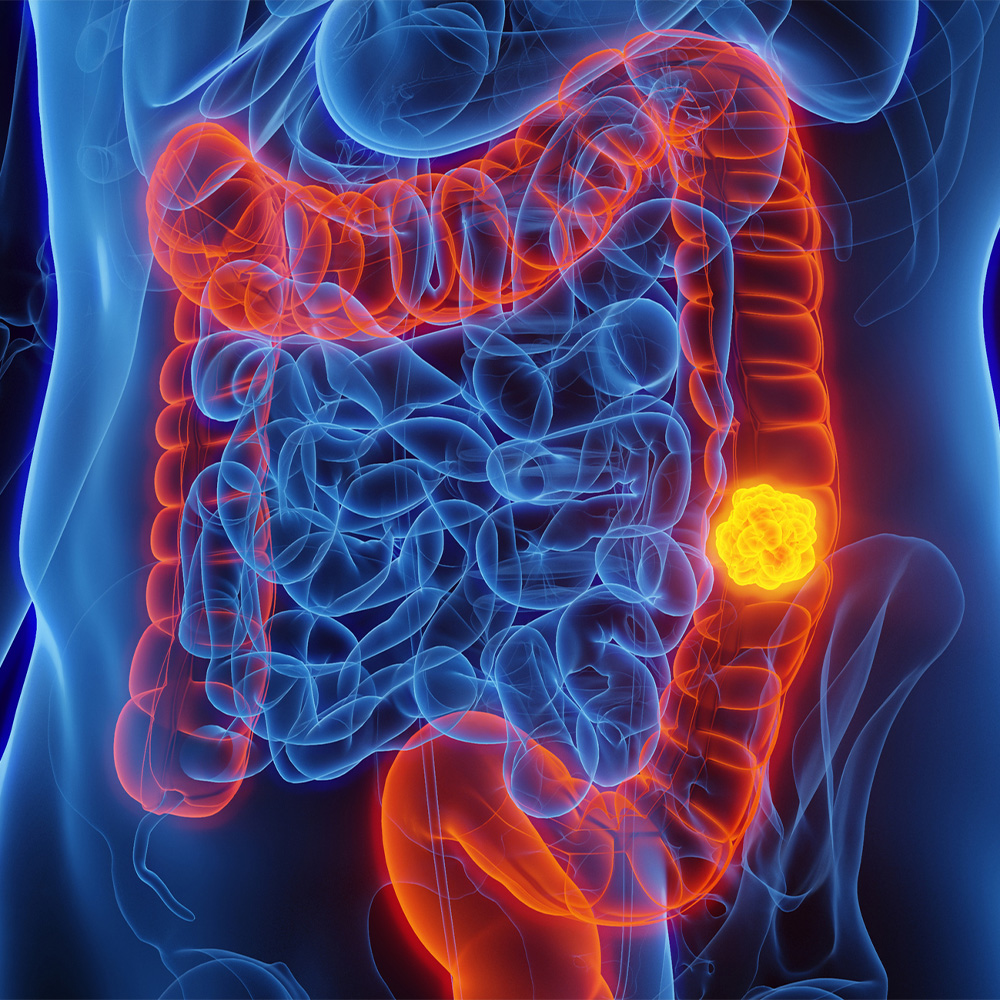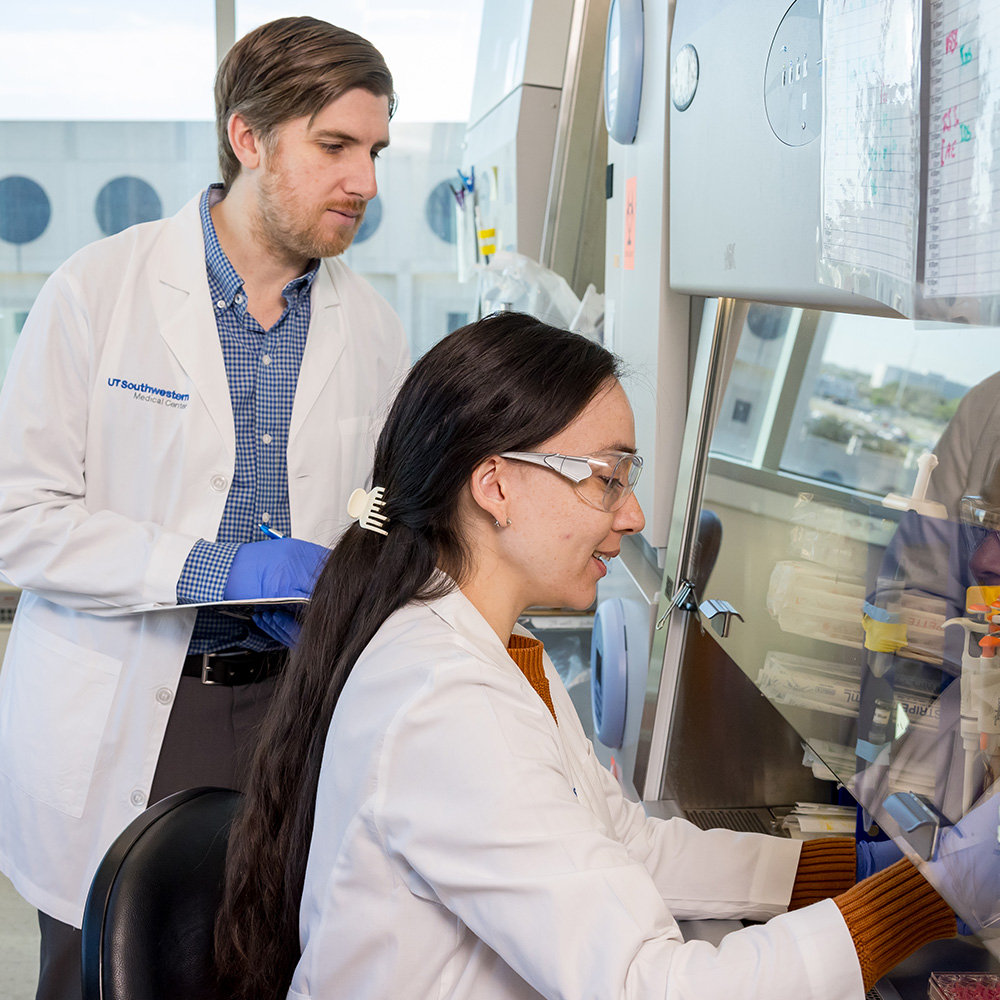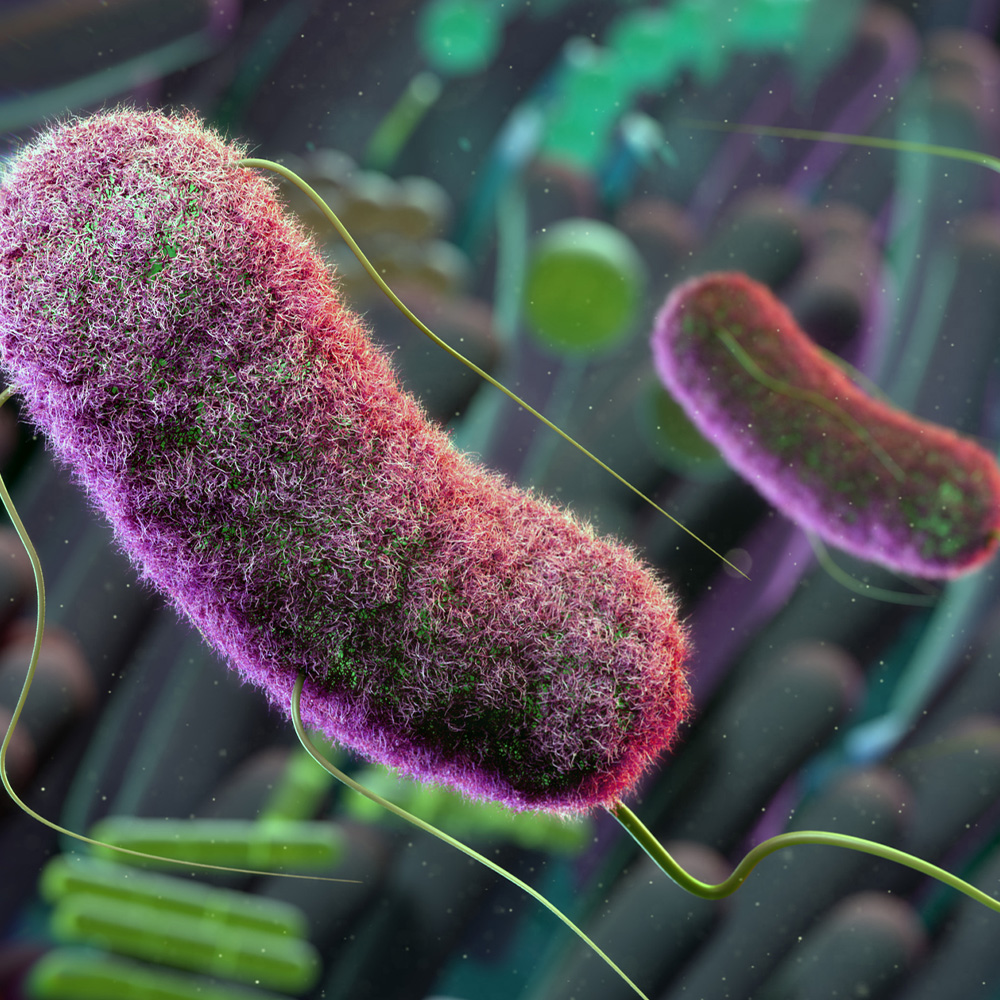CPRIT awards investigators $16 million for cancer therapy research

DALLAS – March 29, 2018 – More than a dozen UT Southwestern Simmons Cancer Center researchers received awards from the Cancer Prevention and Research Institute of Texas (CPRIT) for research into breast, prostate, brain, kidney, liver, and pediatric cancers.
In addition, the more than $27 million in total awards from CPRIT includes research for innovative ways to restore immunity against cancer, to combat cancer therapy resistance, and to develop nanosensor technologies to illuminate cancer tissues to improve cancer staging, along with outreach cancer screening programs to underserved communities.
“UT Southwestern cancer researchers are continually seeking better ways to diagnose and treat cancer, and these grants propel this important work forward,” said Dr. Carlos L. Arteaga, Director of UT Southwestern’s Harold C. Simmons Comprehensive Cancer Center, one of just 49 National Cancer Institute-designated Comprehensive Cancer Centers in the nation. “Texas taxpayers’ support of CPRIT furthers research by UT Southwestern basic scientists, physician-scientists, and clinical investigators to learn more about how cancer occurs, to develop improved cancer therapies, and to step up prevention efforts.”
Among other efforts, these grants fund research on the role played by extra chromosomes in the development of liver cancer, continue work on a way to illuminate cancer, and support hepatitis C screening among baby boomers, said Dr. Arteaga, Associate Dean of Oncology Programs and who holds The Lisa K. Simmons Distinguished Chair in Comprehensive Oncology.
CPRIT Individual Investigator Awards to UT Southwestern researchers are:
Breast Cancer: $2.3 million
Dr. Vlad Zaha, Assistant Professor of Internal Medicine, will study methods for early detection of anthracycline-induced cardiotoxicity – heart disease resulting from a chemotherapeutic drug commonly used to treat breast cancer. The life-time risk of heart failure increases with increasing cumulative doses of anthracyclines, but there is no “safe dose” threshold for cardiotoxicity. This risk is severely amplified by underlying cardiovascular risk factors in cancer survivors. UT Southwestern researchers have extensive expertise in advanced investigations of heart metabolism and are the first in the United States to apply this novel methodology for heart studies. ($2,397,204)
Kidney Cancer: $2 million
Two grants were awarded to Dr. James Brugarolas, Director of the Simmons Cancer Center’s Kidney Cancer Program and Professor of Internal Medicine, one focusing on adult kidney cancer and the second on a form of kidney cancer that affects adolescents. Building upon their pioneering discoveries leading to the first genetic classification of kidney cancer (clear cell renal cell carcinoma), the investigators will focus on the most aggressive subtype of kidney cancer they discovered, which is characterized by inactivation of two genes: BAP1 and PBRM1. In a second study, the researchers will model an aggressive type of kidney cancer that affects adolescents and has no proven treatment, translocation carcinomas. By generating the first faithful animal model of translocation carcinoma, the investigators hope to open the door for new treatments.
Dr. Brugarolas holds the Sherry Wigley Crow Cancer Research Endowed Chair in Honor of Robert Lewis Kirby, M.D. ($1,155,128 and $897,633)
Brain Cancer: $1.2 million
The Peter O’Donnell Jr. Brain Institute’s Dr. Robert Bachoo, Associate Professor of Neurology and Neurotherapeutics, and Internal Medicine will study metabolic regulation of pediatric glioma. Pediatric brain cancer is among the most challenging tumors to treat, with short survival times despite intense multimodality treatment. While progress has been made in cataloguing the genetic changes associated with these aggressive tumors there is no direct link between how individual mutations impact tumor cell growth. This project will focus on understanding how specific mutations influence pediatric brain tumor metabolism with the goal of identifying possible therapeutic vulnerabilities. ($1,200,000)
Dr. Bachoo holds the Miller Family Professorship in Neuro‐Oncology
Blood Cancer: $1.2 million
Simmons Cancer Center’s Dr. Stephen Skapek, Chief of Pediatric Hematology-Oncology, will study rhabdomyosarcoma, the most common soft tissue sarcoma in children. Only about 1 in 5 children with metastatic or recurrent disease survive for three years, and this poor outlook has not improved despite many attempts to intensify chemotherapy and use new agents. Dr. Skapek studied over 20,000 genes in rhabdomyosarcoma and identified 33 as possible drivers or tumor suppressors. Researchers hope to determine whether they could be used as biomarkers and targets for possible therapies. ($1,193,363)
Dr. Skapek holds the Distinguished Chair in Pediatric Oncology Research
Simmons Cancer Center’s Dr. Cheng-Ming Chiang, Professor of Biochemistry and Pharmacology, will examine the molecular action of chemical inhibitors that block human papillomavirus (HPV) DNA replication, with the goal of suppressing HPV-associated cancers. HPV-induced cervical cancer is a leading cause of death in women, and HPV is causally associated with some oral cancers developed via sexual contact and found mostly in men. ($900,000)
Selectively Killing Cancer Cells
Simmons Cancer Center’s Dr. Yuh Min Chook, Professor of Pharmacology and Biophysics, will study mechanisms of nuclear export in cancer with the goal of selectively killing cancer cells. Many tumor suppressors are inappropriately transported by the nuclear export receptor CRM1, resulting in survival advantage for cancer cells. The research will investigate the biology behind this mechanism to develop strategies to improve drug tolerability and effectiveness in patients. ($900,000)
Dr. Chook holds the Alfred and Mabel Gilman Chair in Molecular Pharmacology.
Simmons Cancer Center’s Dr. Dean Sherry, Director of the Advanced Imaging Research Center and Professor of Radiology, will study an MRI detection method for reduced levels of zinc ions as a biomarker for prostate cancer. It is well-known that the prostate contains the highest levels of zinc in the human body and that zinc levels fall as prostate cells become malignant, making zinc an attractive biomarker for detection and evaluation of prostate cancer. Prostate cancer accounts for 33 percent of all newly diagnosed malignancies and is the second most common cause of death among men in the United States. ($900,000)
Dr. Elena Vinogradov, Assistant Professor of Radiology and with the Advanced Imaging Research Center, is developing new magnetic resonance imaging (MRI) technology capable of detecting early biochemical changes in breast cancer. The new MRI technology – chemical exchange saturation transfer (CEST) – could lead to a reduction in biopsies and assist with tumor therapy prediction, Dr. Vinogradov said. Since no injections are required and only software modifications are needed, the results of this research could have immediate impact on the diagnosis and management of thousands of breast cancer patients. ($900,000)
Simmons Cancer Center’s Dr. Jian Xu, Assistant Professor of Pediatrics and with Children’s Medical Center Research Institute at UT Southwestern (CRI), will seek to identify epigenetic and metabolic vulnerabilities for myeloproliferative neoplasm (MPN) blood cancers that progress from chronic to acute disease, and to develop therapies to eradicate cancer-initiating cells. A lack of understanding of the molecular processes involved has been a major impediment for developing target-based therapies to selectively eliminate cancer stem cells that could prevent disease progression or relapse. MPNs are progressive blood cancers that can strike anyone at any age and that have no cure. ($900,000)
Dr. Nan Yan, Associate Professor of Immunology and Microbiology, will study how cancer cells suppress innate immunity with the goal of designing drugs that restore the innate immune response to cancer. Researchers recently discovered that cancer cells turn on genes that block innate immune response and turn off genes that drive
innate immune response. His lab will study how these innate immune genes work
inside of cancer cells, how they know or “sense” a cell becomes a cancer cell, and how
they inhibit cancer cell growth. Researchers hope the approach will restore the full capacity of the immune system to fight against cancer. ($900,000)
Dr. Yan is the Rita C. and William P. Clements, Jr. Scholar in Medical Research.
Acute Lymphoblastic Leukemia (ALL)
Simmons Cancer Center’s Dr. Chengcheng “Alec” Zhang, Associate Professor of Physiology, is developing fasting and fasting-mimicking strategies for treating acute lymphoblastic leukemia (ALL), the most common form of cancer in children, which also occurs in adults. Although treatment of pediatric ALL is highly effective, a sizeable number of patients are nonresponders, and the prognosis for adult ALL patients is significantly worse than for pediatric ALL patients. This research builds on research published in Nature Medicine that found that intermittent fasting inhibits ALL development in mouse models, and is a step toward clinical trials. ($900,000)
Dr. Zhang holds the Hortense L. and Morton H. Sanger Professorship in Oncology.
Simmons Cancer Center’s Dr. Hao Zhu, Assistant Professor in the Children’s Medical Center Research Institute at UT Southwestern, will study liver cell polyploidy to understand the impact of chromosome number on liver cancer development. Polyploid cells have more than the usual two sets of chromosomes, and are hypothesized to protect the liver from getting cancer. The project aims to test therapeutic strategies inspired by this naturally occurring phenomenon. If successful, it will provide preclinical validation of a strategy to prevent the development of hepatocellular carcinoma (HCC). Texas maintains the second-highest incidence rate for HCC in the nation at 9.1 per 100,000 people and HCC is the fastest growing cancer in the state. ($900,000)
Simmons Cancer Center’s Dr. Yihong Wan, Associate Professor of Pharmacology, is working to identify new regulators of metastatic bone disease, including a novel dual suppressor, which could be applicable to bone and breast cancer. ($898,672)
Dr. Wan holds the Lawrence G. Raisz Professorship in Bone Cell Research.
Simmons Cancer Center’s Dr. Jinming Gao, Professor of Otolaryngology and Pharmacology, and Dr. Baran Sumer, Associate Professor of Otolaryngology, are developing positron emission tomography (PET) tracers to detect cancer-involved lymph nodes. Lymph node metastasis is an important determinant of survival for many solid cancers. Current methods require nodal dissections that result in significant morbidity, including shoulder dysfunction and pain in head and neck patients, and lymphedema in breast cancer patients. Dr. Gao and Dr. Sumer are working on PET-sensitive pH threshold sensors targeting tumor acidosis for non-invasive staging of nodal metastasis with successful preliminary data in mouse tumor models. ($885,684)
Dr. Gao holds the Robert B. and Virginia Payne Professorship in Oncology
Lung/Breast/Prostate/Kidney Cancers
Simmons Cancer Center’s Dr. Joseph Ready, Professor of Biochemistry, will study tumor-activated enzyme inhibitors for the treatment of cancer. Traditional chemotherapies injure both cancer cells and normal cells. Dr. Ready’s lab is developing compounds that are potent enzyme inhibitors, which block tumor growth and are less toxic than conventional inhibitors. Analysis of human tumor samples indicates that 15-25 percent of lung, breast, prostate, and clear cell renal cell cancer patients could benefit from this approach. ($607,831)
Dr. Ready holds the Bonnie Bell Harding Professorship in Biochemistry.
CPRIT awards also included grants totaling $8 million to recruit leading cancer scientists to UT Southwestern, which is recognizing its 75th anniversary this year. The Harold C. Simmons Comprehensive Cancer Center is the only NCI-designated Comprehensive Cancer Center in North Texas and among just 30 U.S. cancer research centers to be designated by the NCI as a National Clinical Trials Network Lead Academic Participating Site.
CPRIT, established in 2007, has the goal of bringing world-class research and cancer-prevention efforts to Texas. To date, CPRIT has awarded grants totaling $1.95 billion and has reached every county in Texas. The current round of CPRIT awards comprises 49 academic research grants and eight prevention grants totaling more than $73 million. In total, UT Southwestern has been awarded $338 million by CPRIT since the agency began making awards.
About UT Southwestern Medical Center
UT Southwestern, one of the premier academic medical centers in the nation, integrates pioneering biomedical research with exceptional clinical care and education. The institution’s faculty has received six Nobel Prizes, and includes 22 members of the National Academy of Sciences, 17 members of the National Academy of Medicine, and 14 Howard Hughes Medical Institute Investigators. The faculty of more than 2,700 is responsible for groundbreaking medical advances and is committed to translating science-driven research quickly to new clinical treatments. UT Southwestern physicians provide care in about 80 specialties to more than 100,000 hospitalized patients, 600,000 emergency room cases, and oversee approximately 2.2 million outpatient visits a year.




